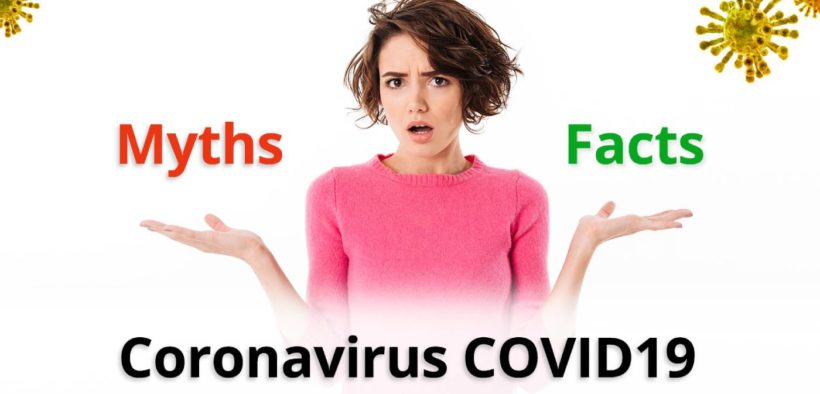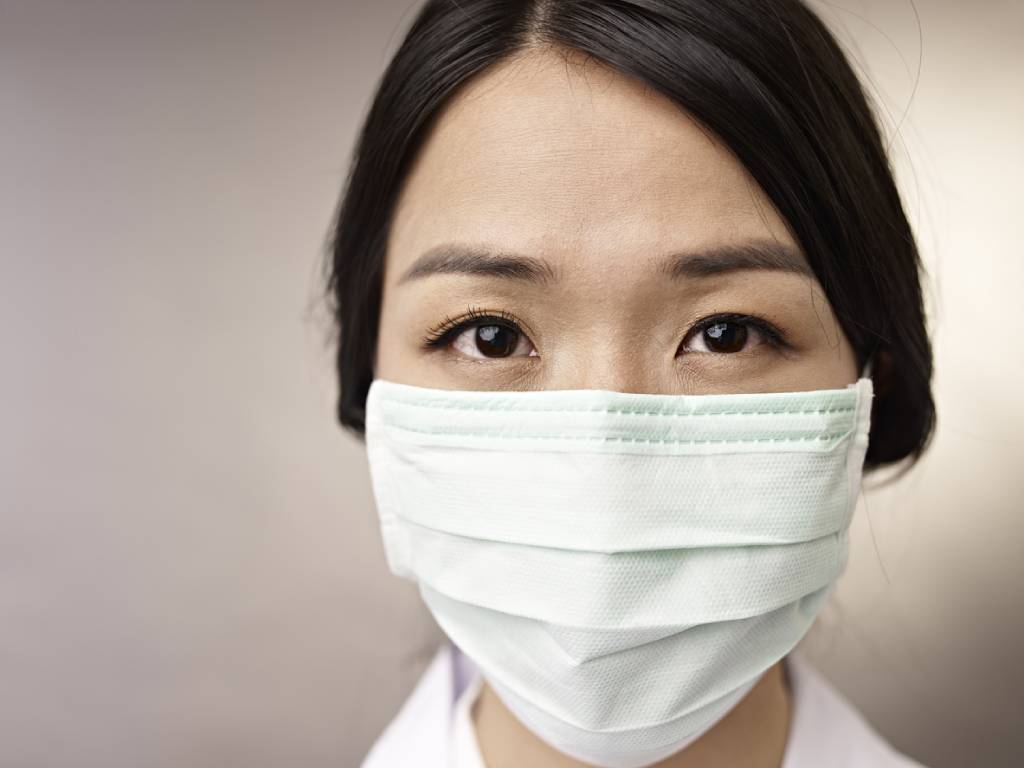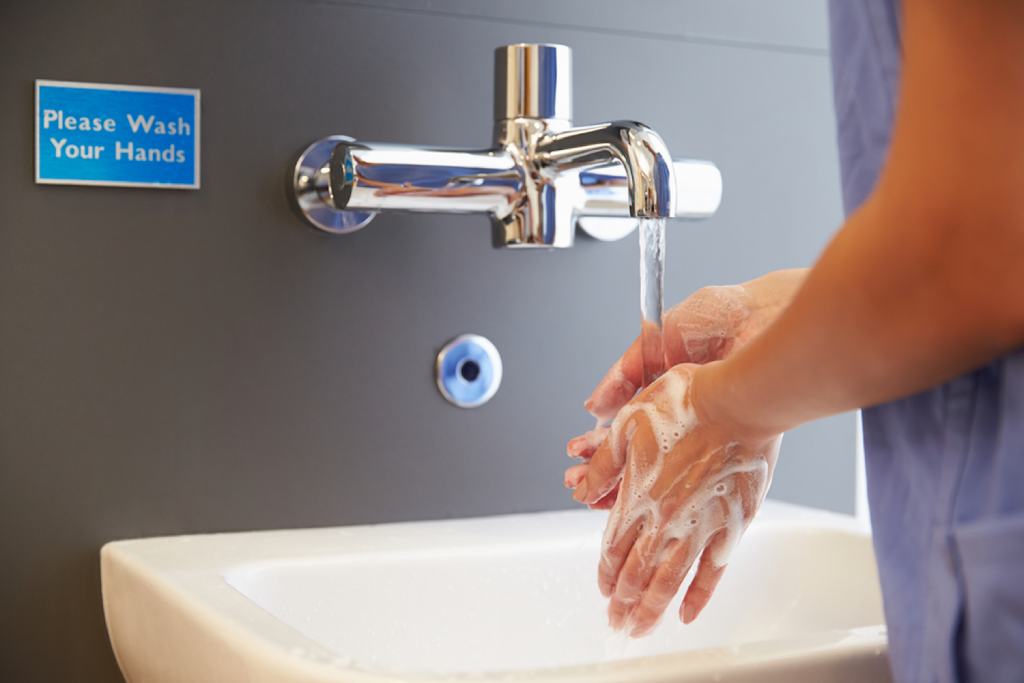Myths and Facts About Coronavirus (COVID-19)

‘Coronavirus’ is the word that’s sending chills down the spine. The ambiguity and agitation around the topic are making people anxious. The myths and facts about Coronavirus are more petrifying than the disease itself. Because each fact could save a life and each myth might put a life in danger!
The news articles and social media posts are shared outrageously. Some have authentic sources while some are just fancy fables.
In this moment of crisis, only the right knowledge can shield us from the slayer.
Hence, it is of utmost importance that we differentiate what is true and what is not.
Here are a list of myths and facts about Coronavirus that you must know
Myths and Facts About Coronavirus: Myths
1. Myth 1: Coronavirus was made in a lab.
There is a wild word circulation that coronavirus is a weapon of bio-war. And that it’s made in the lab!!!
But there is no evidence of all such claims.
According to WHO, COVID-19 can be traced back to bats!
It is similar to the earlier cases of naturally occurring Coronavirus. All of them have the same origin as animals.
The outbreak of COVID-19 in Wuhan, China is also linked to the consumption of uncooked seafood and live animals.
2. Myth 2: Face masks protect you from COVID-19.

People are stocking up piles of face masks creating a scarcity in the market.
But why?
Regular face masks do not offer protection from the virus. They can neither block the virus not fight it.
However, certain models of professional respirators (N95) may be helpful. They are effective in reducing the spread within health care facilities.
But again, the user needs proper training to wear an N95 mask. It should fit properly around their nose, cheeks, and chins. Also, wearers must learn to check the equipment for damage after each use.
WHO answers who should wear the mask. People who are sick, suspected or taking care of the sick should wear the mask.
Doctors don’t recommend face masks to healthy people.
But stocking up on masks by healthy people makes fewer available for sick patients.
3. Myth 3: Coronavirus can’t sustain at a certain temperature
It is a widespread myth that warmer weather could curb the spread of the coronavirus.
As much as we would like that to happen, scientifically there has been no evidence yet.
Neither cold weather nor hot and humid weather could stop the virus from spreading.
It has stirred turbulence in South Asian countries with hot and humid temperatures. As well as creating turmoil in Italy that reports low temperatures.
Hence, regardless of the climate, the COVID-19 has transmitted in ALL AREAS.
So, don’t depend on weather or nature to protect you.
Take appropriate measures and recommended precautions. Wash your palm and back for 20 seconds. Maintain proper hygiene. And practice social distancing.
4. Myth 4: Hot bath, alcohol or chlorine kills coronavirus
Another bizarre myth that’s doing the rounds is that hot bath, chlorine or alcohol can kill coronavirus.
Once you are infected, doing any of these won’t bring a cure.
A hot water bath doesn’t raise the temperature of your body. Chemicals that disinfect the surface of an object can’t clean your organs!
While they may protect you from getting infected, they are not a cure.
Alcohol sanitizers, handwashing with soap or even chlorine can kill the virus when it’s still on your hands. Before it has passed into the cavities of your body.
5. Myth 5: Younger and healthy people are not at risk!
First of all, how many young people are sure about their health status?
We don’t keep a constant tab on our health parameters. We don’t know how strong or weak our immune system is. Plus, we never know what disease might be breeding inside.
This was not to scare you! But it’s a fact.
Recently in Spain, a 21-year-old football coach name Francisco Garcia died of coronavirus. Only after being detected with coronavirus he was diagnosed with Leukemia.
It’s true that older people are indeed more vulnerable. Also, people with pre-existing medical conditions like asthma, diabetes, and heart disease are at high risk.
However, people of all and any age can get infected by the new coronavirus.
Hence, it is important that every person follow preventive measures. Irrespective of their age or health status.
6. Myth 6: Saline, garlic, and sesame oil can prevent it
We are wired to believe that every disease root back to a simple home remedy.
Be it cough, cold, digestion or coronavirus.
So, it is no surprise that we seek solace in our traditional remedies. Especially when modern technologies fail to answer our queries.
Nevertheless, there is no evidence that these home remedies offer a cure!
Be it rinsing the nose with saline. Eating garlic. Applying sesame oil.
These cannot protect people from infection with the new coronavirus.
Saline and sesame oil might help with the common cold. And garlic does have some antimicrobial properties. But there is no evidence that they can prevent respiratory infections.
7. Myth 7: There are MEDICINES to treat it.
We are hearing cases of death as well as cases of recovery!
But the cases of recovery are not because of some secret medicine. It is an individual’s immune system that stood tough in the face of coronavirus.
To date, there are no medicines to treat the novel coronavirus. However, researchers from all across are working to find a cure soon!
Medical units are making constant efforts to create a cure for this epidemic.
But so far there is no specific medicine recommended to prevent or treat the new coronavirus.
The care given to COVID-19 patients is to treat and soothe the symptoms. But not to cure the infection.
8. Myth 8: Hand dryers can kill coronavirus

The heat from hand dryers is not enough to kill the strains of coronavirus. It’s a myth.
The only way to keep your hands safe is by washing them both sides for 20 seconds. Or by rubbing a hand sanitizer on the complete surface of your hands.
9. Myth 9: Gomutra can kill coronavirus
Hindus consider the cow sacred and cow urine holy.
They believe that cow urine and cow dung have medicinal properties. And believe that it can cure serious illnesses like cancer.
Recently, some Hindus hosted a Gomutra drinking party to ward off coronavirus.
However, experts have repeatedly said that there is no evidence of such claims.
There is no evidence that gomutra can kill coronavirus or cancer cells.
10. Myth 10: There is a vaccine to prevent coronavirus
Till date, there is no vaccine that can prevent coronavirus.
And if someone is trying to sell you one, know that it’s a hoax!
Scientists from all over are working to develop one. But it might take months to develop a vaccine that’s safe and effective.
Myths and Facts About Coronavirus: Facts
Let’s look at the Facts too
1. Fact 1: Coronavirus spread can be controlled
Yes. The outbreak of coronavirus can be controlled.
With proper measures and precautions from the government and people, we can stop the virus from spreading.
Avoiding contact. Social distancing. Hand washing. Hygiene. These are some ways to break the chain of coronavirus.
2. Fact 2: New Coronavirus doesn’t spread with mosquito bites
There is no case found where the infection was spread through mosquito bites.
The new coronavirus is a respiratory virus.
It primarily spreads through droplets of coughs or sneezes.
It also gets transmitted through droplets of saliva or mucus.
An infected person who has used his hand to rub the nose or mouth can carry the virus in their hands.
Thus, handshaking or close contact can also spread the virus.
Hence, people are urging to go for Namaste rather than a handshake.

3. Fact 3: The virus can live for hours on non-living objects
It is true that the virus can live on non-living objects for hours.
Coronavirus can be alive on metal surfaces, fabrics, poles and paper.
- It can be on the doorknob and tabletops.
- The deadly virus can be on your money, ATM card, mobile phone and on your clothes.
- It can live on steel surfaces for two days.
- On wood and glass, it survives for four days.
- And it lasts on metal, plastic, and ceramics for five days.
- On aluminum, it survives between two and eight and less than eight hours on latex.
- Coins are more dangerous as they transmit the virus better than cash.
Conclusion: Myths and Facts About Coronavirus
A lot of myths and facts about coronavirus is circulated. In WhatsApp, Facebook, TV, and newspaper.
But it is very crucial to differentiate the right and the wrong.
In the moments of doubt, follow the basic instructions.
- Washing both sides of your hands for 20 seconds.
- Use an alcohol-based sanitizer.
- Stay away from the crowd.
- Avoid going out.
- Maintain peak hygiene.
- Change your clothes after you come from outside.
- Avoid touching doors, handles, buttons, etc. with your hand. Use your elbow instead.
If you still have doubts or queries on myths and facts about coronavirus, you can write to us. Or ask your health care specialist!
















